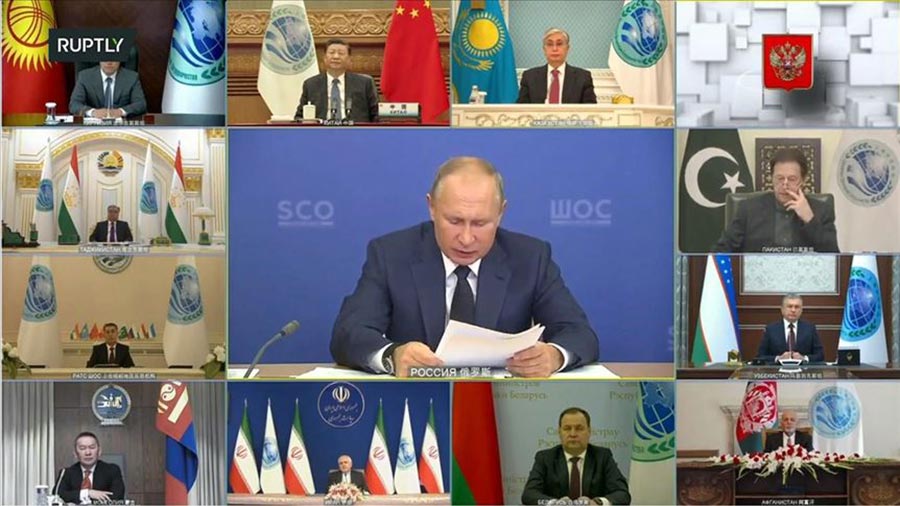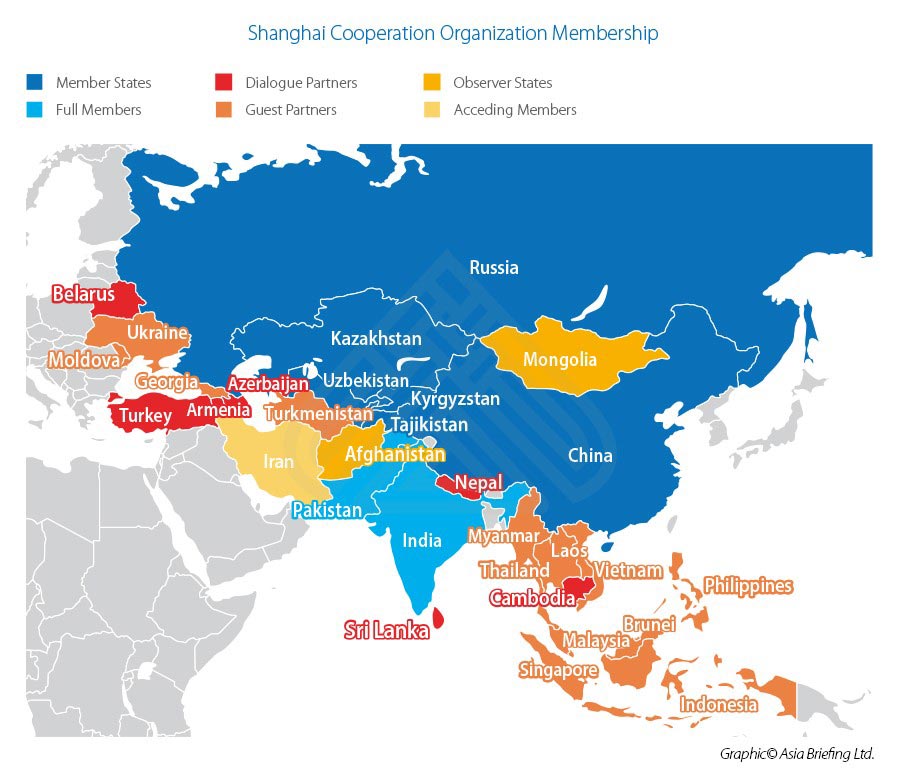The Shanghai Cooperation Organisation November 2020 Summit Overview

Op/Ed by Chris Devonshire-Ellis
- SCO covers 42% of global population and 22% of land
- Better integration and cooperation in fighting Covid-19
- Establishment of an epidemiological safety network
- Calls for mutual trade settlement in national currencies
- ‘Moscow Declaration’ issued in response to global challenges
The Shanghai Cooperation Organisation held its annual summit last week, with the Presidents of China, Russia, Kazakhstan, Kyrgyzstan, Tajikistan, Uzbekistan, India, and Pakistan all in virtual attendance. Observer state include Belarus, Mongolia, Iran, Afghanistan, while Armenia, Azerbaijan, Cambodia, Nepal, Turkey and Sri Lanka are SCO dialogue partners. Guests include the ASEAN nations, CIS, Turkmenistan and the United Nations. Russia hosted with Russian President Vladimir Putin in the Chair.
SCO member states account for around 42% of the world’s population, 22% of the land area, and around 20% of global GDP. This year’s focus was on ways to promote the SCO member states’ practical interaction in politics, security, trade and the economy, cultural and humanitarian ties, as well as political dialogue, above all in the interests of stability in the SCO space. The enhancement of their countries’ trade and economic collaboration and coordination was also on the agenda.

An Epidemiological Safety Network
Covid-19 was seen as the main challenge to the international community, with members noting that the lack of a consolidated response to that challenge revealed serious shortcomings in international cooperation. There was criticism of the West and the United States in particular that the world’s largest powers proved unable to iron out their differences, even in the face of such a grave biological threat.
The SCO pledged to provide “Mutual humanitarian assistance and exchange of specialists in fighting epidemics, sending these specialists to the most endangered areas helped to stabilize the situation in the SCO’s member countries. We are going to endorse a comprehensive plan of joint action against the epidemic threat, and this will be our collective response to this challenge of our times. We attribute special importance to the SCO’s initiative on the creation under the auspices of the World Health Organization of a network of regional centers focused on control of epidemic disease and biological security.” The building of an epidemiological safety network was endorsed and supported by other SCO members, with suggestions that “We could create a system of information exchange, sharing the best practices of treatment, as well as the most effective tested medicine for fighting coronavirus.”
Proposed ‘International Agency for Biological Safety’
The SCO members wish to establish a special multilateral body – the ‘International Agency for Biological Safety’ to control the threat of biological weapons, with plans to bring this concept to the United Nations’ General Assembly.
Movement away from US Dollar in multilateral trade
Kazakhstan’s President Kassym-Jomart Tokayev proposed to adopt a Roadmap for a gradual increase in the share of national currencies in mutual settlements within the SCO. “The strengthening of protectionism and the rupture of international supply chains are pushing us to unlock the economic potential of the SCO. The Roadmap for a gradual increase in the share of national currencies in mutual settlements, as well as the creation of a Eurasian financial advisory mechanism, can give a good impetus.” Tokayev said. Member states also discussed the creation of financial stabilization mechanisms inside the SCO to offset future financial attacks or sanctions.
Improving dialogue with the West, Expanding the Belt & Road
Attendees recognised that more dialogue between East and West could reduce tensions and the lack of trust leading to the threat of “hybrid wars” as violent methods of prevention where “preventive diplomacy” fails; while at the same time showing support for the Belt & Road Initiative, with an extension of its benefits to countries outside Eurasia.
Chinese President Xi Jinping told the summit to “Oppose interference by external forces” with apparent reference to the United States and China’s recent experience of the US-China Trade War. “The world is entering a period of turbulence and transformation. The international community now faces a major test with choices to be made between multilateralism and unilateralism, openness and seclusion, cooperation and confrontation.” Xi said.
Russian President Vladimir Putin welcomed Xi’s statement and noted the intensification of foreign policy and military cooperation between SCO members to combat ‘external pressures’.
China-India border disputes
In his address, Indian Prime Minister Modi said it was “unfortunate” that there were “unnecessary attempts” to bring bilateral issues into the SCO agenda, and he called on member states to respect “territorial integrity” and “sovereignty”.
Improving dialogue with the United Nations
This summit completes Russia’s chairmanship of the SCO in 2019-2020. The jubilee, twentieth summit of the Shanghai Cooperation Organization is planned to be held on September 16-17 in Dushanbe. In 2021, the chairmanship of the SCO will pass from Russia to Tajikistan. According to the President of Tajikistan Emomali Rahmon, in the framework of its chairmanship, Tajikistan intends to make the necessary efforts to strengthen the international positions of the SCO: to hold high-level joint events between the SCO and the United Nations.
The SCO 2020 Moscow Declaration
The SCO leaders approved the Moscow Declaration which states that SCO members: “firmly advocate the preservation and consolidation of the existing norms and mechanisms of global stability and arms control”; “express regret over the discontinuation” of the INF treaty; “stand for keeping … outer space free of any weapons”; and “are in favor of shaping a multipolar world.”
A series of additional documents was also adopted following the meeting, including the Moscow Declaration of the SCO Heads of State Council. These are:
- Resolutions of the SCO Heads of State Council approving the 2021–2025 Action Plan for the implementation of the SCO Development Strategy until 2025
- The SCO Cooperation Concept for Developing Remote and Rural Territories in the Digital Age
- The SCO Comprehensive Plan of Joint Measures to Counter Epidemics in the Region.
Additional decisions were made to sign memorandums of understanding between the SCO Secretariat and the Secretariat of the UN Economic and Social Commission for Asia and the Pacific, the Eurasian Economic Commission, the World Health Organisation, and the SCO Culture and Integration Centre.
About Us
Silk Road Briefing is written by Dezan Shira & Associates. The firm has 28 offices throughout Asia, and assists foreign investors into the region. For strategic advisory and business intelligence issues please contact the firm at silkroad@dezshira.com or visit www.dezshira.com





